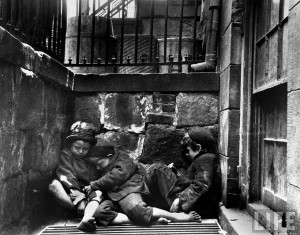Make no mistake, Christians should be biased.
I know there has been a lot of conversation in the past few years about Christians cleaning up their image. We are often known more for our prejudices than principles. But that doesn't mean we should simply throw out our moral compasses and sway with whatever the popular winds of the day may be.
American Christians have far too often failed to heed the call in Romans 12:2, "Do not be conformed to this world, but be transformed by the renewing of your minds, so that you may discern what is the will of God-what is good and acceptable and perfect."
Nowhere is the Christian conformity to this world more obvious than in our failure to be biased on behalf of the poor.
My initial awakening to this fact didn't come from reading Jim Wallis, Ron Sider or Tony Campolo. It all started during my last two years of high school, while I was being homeschooled.
Previously, I had attended a private Christian school and much of my study of the Bible was carefully directed. But now I was taking some courses online, one at the local community college and others directed by my parents. My Bible class consisted of reading through the New Testament and meeting with my pastor once a week.
Just 25 chapters into my assignment I was shocked. I'm sure I had heard it before but I had never paid attention. But, as an Evangelical Christian who takes the Bible very seriously, I was quite troubled to read about Jesus dividing the world into just two categories -- those who took care of the poor, hungry, sick, needy and imprisoned and those who did not.
I had a lot of visions in my head about what got somebody into heaven or not. But how I treated the poor wasn't one of them.
I had a lot of questions for my pastor that week. Then when we hit Mary's Magnificat, Luke 4 and Acts 2, I had a whole lot more. By the time I read the book of James, I started to wonder whether I could consider myself a Christian at all.
At first, these theological discoveries were focused just on my own actions. As I changed my behavior and got to know poor people and serve them, this theology began to change how I viewed politics and public policy. Not every Christian who shares my concern for the poor has the same view on policy or politics. But, here is a prejudice I am not going to back away from.
To be a follower of Christ is to be biased for the poor.
In life, we all have our biases. Some of them are natural tendencies or inclinations and others are habituated. Our culture tells us to be biased -- in a deferential sense -- towards those who can pay us back or who can look out for us in return. Society tells us to get in with the strong and the powerful because they will give us strength and power in return.
Jesus teaches something very different.
He tells his followers to go hang out with those who are marginalized and picked on by the rest of the culture. He told the poor they were blessed and sent the rich young ruler away.
To be conformed to this world is to be biased for the wealthy and powerful.
At the time that I was reading through the New Testament I had a Keith Green CD playing on a never-ending loop. Every time I got to his song "The Sheep and the Goats," it would send chills down my spine.
Part of me wanted to think Green was exaggerating until I remembered that he was pulling his lyrics directly from Scripture. But, the rest of me felt convicted about having conformed myself to the world when it came to how I viewed a world in need.
Humor me if you will: Take a few minutes to listen and watch Green perform this song.
Now, start browsing your regular news and commentary sites.
Does it change how you view the news of the day?
What headlines are important?
What matters to Jesus?
Where do your biases lie?
 Tim King is communications director at Sojourners. Follow Tim on Twitter @TMKing.
Tim King is communications director at Sojourners. Follow Tim on Twitter @TMKing.
Got something to say about what you're reading? We value your feedback!
